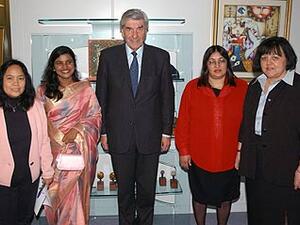Afghanistan: High Commissioner's mission
Afghanistan: High Commissioner's mission
High Commissioner Ruud Lubbers leaves this afternoon on an eight-day mission to Iran, Afghanistan and Pakistan, where he'll get a first-hand look at UNHCR's largest current repatriation operation - with some 223,000 returnees over the past six weeks.
Mr. Lubbers, on his third mission to the region in a year, arrives early Saturday in Teheran, where he is scheduled to meet the president and members of the Cabinet before travelling to Mashad. On Sunday, he will go overland to Herat in western Afghanistan after reviewing the repatriation activities at the frontier.
In Afghanistan, he will see UNHCR assistance activities and rehabilitation projects in Herat, Kabul and Jalalabad. Throughout his mission, Mr. Lubbers will be emphasising the importance of ensuring that the growing number of Afghans going home be given the longer-term support they need to make their return sustainable.
After scheduled meetings with President Karzai and members of the Interim Authority, as well as Special Representative of the U.N. Secretary-General Lakhdar Brahimi and his senior staff in Kabul, Mr. Lubbers plans to visit UNHCR projects in eastern Afghanistan. He will travel from Jalalabad to Peshawar, Pakistan, a route travelled by a majority of the recent Afghan refugees.
Meanwhile, return movements from Pakistan have been proceeding since a one-day interruption on Tuesday, when demonstrating poppy farmers set up roadblocks in eastern Afghanistan.
From Iran, the number of returns has also picked up since the assisted repatriation operation started Tuesday. More than 1,300 Afghans returned via the Islam Qala border crossing in the first three days of the operation. Once they reach the border in Iranian government-hired buses, IOM trucks carry them onwards to the home provinces after they collect their travel grants and get their UNHCR family packages, as is also the case for the refugees returning from Pakistan.
Likewise, on the Tajik-Afghan border, more than 3,900 Afghans who've been living in island camps in the Pyandj River have returned home since UNHCR and IOM began shifting them back to northern Afghanistan's Kunduz Province beginning on Monday.
All these movements represent a vote of confidence by Afghanistan's war-weary refugee population, and we hope that return movements can be maintained without upsetting the devastated country's absorption capacity.
UNHCR itself is not encouraging returns due to the precarious security situation in some parts of Afghanistan and the threat of landmines. But, together with our partner agencies, we are assisting Afghans who want to return home and we give them some assistance items. We have also urged host countries not to force Afghans back at this time.
We hope that the situation inside Afghanistan continues to stabilize over the coming months and that donor support for the government's rehabilitation and development efforts remains strong.
Still of concern is the fate of some 40,000 Afghans who are stranded just inside Pakistan's Chaman border crossing, some of them now in their second month at the squalid site. Though we were initially authorized to transfer the Afghans to a camp, the federal government did not endorse the local authorities' humanitarian initiative.






